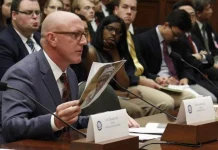The Federal Government on Tuesday launched a new digital initiative designed to entrench transparency, accountability, and efficiency in Nigeria’s tertiary education sector.
The platform called the Federal Government Tertiary Institution Governance and Transparency Platform (FTIGTP) was officially unveiled by the Minister of Education, Dr. Tunji Alausa, in Abuja.
Alausa described the development as a “major milestone” in the government’s drive to reform the management of universities, polytechnics, and colleges of education through data-driven governance.
He said the FTIGTP will serve as a centralized digital database that provides real-time access to verified institutional, financial, and administrative information across all tertiary institutions in the country.
“For the first time, Nigeria will have a single, reliable source of truth on student enrolment, research grants, government allocations, TETFund interventions, and key performance metrics for benchmarking institutions,” the minister said.
According to Alausa, the platform aligns with President Bola Ahmed Tinubu’s Renewed Hope Agenda, which emphasizes transparency and accountability in public institutions.
“The FTIGTP fulfills President Tinubu’s promise of open governance. Nigerians will now be able to see, in clear terms, how public resources are allocated and utilized within our tertiary education system,” he added.
The minister explained that the initiative would bridge decades of institutional data fragmentation that has hindered effective planning and fiscal responsibility.
Among the expected benefits are improved planning and budgeting, enhanced credibility for international partnerships, stronger collaboration with industry, and better institutional competitiveness through performance benchmarking.
He also noted that compliance with the platform will be mandatory for all tertiary institutions. Each institution must submit annual data in the first quarter, including details of budgetary allocations, personnel costs, capital expenditure, and research funding.
Additionally, universities and colleges will be required to publish endowment values quarterly, disclose the number of undergraduate and postgraduate students, and detail all inflows from local and international research grants.
“The FTIGTP is not just a digital portal—it’s a reform instrument,” Alausa stressed. “It will strengthen accountability, reduce opacity, and promote results-based management across Nigeria’s tertiary education landscape.”
The Federal Ministry of Education said the initiative is also designed to align Nigeria’s education governance framework with global best practices.
Beyond compliance, the ministry emphasized that the portal is central to a broader reform agenda aimed at restoring public trust, supporting performance-based funding, and boosting Nigeria’s global education ranking.
It added that periodic audits will be conducted to ensure accuracy and transparency, while future funding and interventions, including those from TETFund, will depend on full adherence to the reporting requirements.
“By placing these figures in the open, the government intends to curb mismanagement, strengthen accountability, and give parents, students, and stakeholders a clear picture of where education funds truly go,” the ministry said in a statement.


























